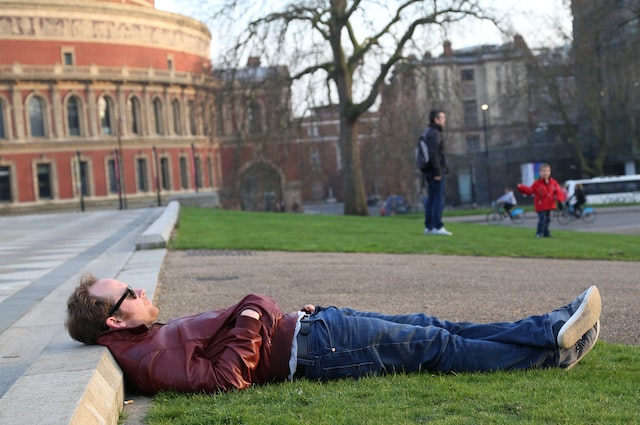ライフハックとしてではなく、英語学習にも極めて有用なのが、著名人が10分程度のプレゼンを行うTEDです。
TED Talksとは、あらゆる分野のエキスパートたちによるプレゼンテーションを無料で視聴できる動画配信サービスのことです。10年ほど前にサービスが開始されてから、政治、心理学、経済、日常生活などの幅広いコンテンツが視聴できることから人気を集めています。
RareJob English Lab
TEDは4000を超える膨大な数の動画があります。しかし慣れないうちは、動画の探し方や視聴のコツが分かりませんよね。この記事では、数多くのTEDを見てきた管理人(塩@saltandshio)が、心を揺さぶられたトークをあらすじと一緒にご紹介します。
ビジネス英会話を効率よく身につけたい方におすすめスクール
シェーン英会話
シェーンは1977年の創業以来、ネイティブ講師が英語を英語で教える「直接教授法」を採用しています。首都圏におけるスクール拠点数は、ネイティブ講師の英会話スクールでNo.1。駅から近いスクールが多いので通いやすく時間を有効に使えます。
スピークバディ パーソナルコーチング
1日1時間の短期集中トレーニングで、あなたの英語力向上をコーチが全力でサポートします。あなたの英語の世界が、劇的に変わります。
クラウディア・アギーレ:眠らなかったらどうなる?
アメリカでは、成人の30%未成年者の66%が日常的に睡眠不足だと推定されています。不眠は深刻な健康害を起こしかねなく、無視できる些細な事ではありません。クラウディア・アギーレは、不眠から来る身体や脳への影響について話します(約4分半)。Claudia Aguirre / What would happen if you didn’t sleep?
[PR]無料体験レッスン実施中!全国208校、創業40年の老舗英会話スクール【シェーン英会話】眠らなかったらどうなるのか
パソコンやスマートフォン、そしてゲーム機器や各サブスクリプションの普及によって、もはや睡眠不足は現代病のひとつに数えられるようになりました。学校や職場でも睡眠不足の人があたりまえにいる時代になりましたが、では人間はずっと眠らずにいたらどうなるのでしょうか。
1965年に当時17才の高校生だったランディ・ガードナーが、264時間眠らない実験をしました。「不眠記録への挑戦」というタイトルが付けられたその実験は、冬休みの自由研究として行われ、カフェインなどの興奮剤を一切使わずに264時間=11日間の不眠記録を作りました。ちなみにこの記録はギネスにも登録されました。
11日間の実験によって、実際にランディ・ガードナーの体にはどのような症状が現れたのでしょうか。
2日目には目の焦点が合わなくなり、次に触ることで物体を判別する能力を失い、3日目には情緒不安定になり動きがぎこちなくなりました。実験の終盤には集中力が低下し、短期記憶に支障を来たし、被害妄想が始り、幻覚を見始めました。
On the second day, his eyes stopped focusing. Next, he lost the ability to identify objects by touch. By day three, Gardner was moody and uncoordinated. At the end of the experiment, he was struggling to concentrate, had trouble with short-term memory, became paranoid, and started hallucinating.
余談ですが、11日目にようやく眠りについたランディ・ガードナーは、その後15時間眠り続けて1週間後にはようやく普通の状態に戻ります。この記録は現在も破られていませんが、それには理由があります。この実験が終わったあとでランディ・ガードナーが不眠に悩まされるようになったことから、ギネス側が後遺症が残るような実験は危険だと判断して不眠記録の新規受付を中止したのです。
[PR]まずは無料カウンセリング”続けるため”の オンライン英語コーチ「スピークバディ パーソナルコーチング」成人なら7~8時間、未成年者は10時間の睡眠が必要
実際のところ、わたしたちは何時間眠るのがベストなのでしょうか。専門家によれば、「睡眠時間は人それぞれ、日中の眠気で困らなければ十分」という見解を示していますが、平均手には成人は一晩に7~8時間の睡眠が必要で、未成年者は約10時間は睡眠時間が必要だといわれています。
睡眠不足の蓄積が、がん、糖尿病や高血圧などの生活習慣病、うつ病などの精神疾患、認知症など、さまざまな疾病の発症リスクを高めることが、各方面の研究結果から明らかになってきております。しかし、単に睡眠時間が長ければ良いというわけでもないようです。
米国の大規模調査では睡眠時間が7時間の人が最も死亡率が低く長寿でした。短い睡眠が健康にとってリスクというのは理解できるかもしれませんが、8時間を超える睡眠時間の人は死亡リスクが上昇するという結果がでています。これまで理想的な睡眠時間は8時間と言われましたが、学問的根拠はなかったのです。
最適な睡眠時間って何時間?―大塚製薬
そもそも、人間はどうして眠たくなるのでしょうか。
疲れたと脳に知らせる身体からの信号や、外が暗くなったと知らせる環境からの信号で眠くなります。アデノシンやメラトニンなどの睡眠誘導物質の分泌量が増えると浅い眠りに入り、それが深い眠りになり呼吸や脈拍数が減少し、筋肉が弛緩します。
We grow sleepy due to signals from our body telling our brain we are tired, and signals from the environment telling us it’s dark outside. The rise in sleep-inducing chemicals, like adenosine and melatonin, send us into a light doze that grows deeper, making our breathing and heart rate slow down and our muscles relax.
この深い眠りによってDNAが修復され、身体が翌日に向け自らを備えるといわれています。
[PR]しちだの魔法ペンなら35日でバイリンガルに!楽天4部門1位の英会話!<七田式>先進国は不眠大国
米国では成人の30%、未成年者の66%は日常的に睡眠不足です!
In the United States, it’s estimated that 30% of adults and 66% of adolescents are regularly sleep-deprived.
この睡眠不足は日本も例外ではありません。経済協力開発機構(OECD)が2021年に発表したデータでは、日本人の平均睡眠時間は7時間22分で加盟30カ国の最下位となっており、平均より1時間も少なくなっています。9~18歳を対象とした調査でも、日本人の平日の睡眠時間はヨーロッパ諸国と比較して1~2時間少なく、大人も子どもも、日本は世界で一番寝ていない国なのです。
しかし、日本は睡眠時間を削って働いたり、勉強したりするのが美徳、というような価値観が蔓延しているため、睡眠時間がみじかくなっているのではという見解もあります(参照:日本人の7割が睡眠不足? 朝日新聞より)。
[PR]知って得する、知らないと損をする!すぐに役立つ相手に合った「伝え方」のコツ!不眠によっておきる病気
昨今では睡眠不足が続くと体に異常をきたすだけでなく、さまざまな病気の要因になると言われています。
不眠は学習、記憶、気分、反応速度に影響が出ます。また、睡眠不足は、炎症、幻覚、高血圧を引き起こす可能性があり、糖尿病や肥満との関連性さえ指摘されています。
When we lose sleep, learning, memory, mood, and reaction time are affected. Sleeplessness may also cause inflammation, halluciations, high blood pressure, and it’s even been linked to diabetes and obesity.
また、不眠症は認知症のリスクも高めるとされています。睡眠不足が続くと脳内に蓄積する老廃物が排出されず、総合的に脳に負荷がかかるため、さまざまな体調不良を引き起こすと考えられているのです。
[PR]検定試験合格者累計140万人!スマホ対応☆国家資格ほか資格取得ならSMART合格対策講座まとめ:睡眠は脳を元気にしてくれる
眠っているとき、実際に脳の中ではなにが起きているのでしょうか。
グリンパティック系と言うシステムが掃除の機能をして、老廃物を取り除いている事が分かりました。このメカニズムは睡眠中は活発に働き、脳脊髄液で細胞間にある 害となる副産物を流し出します。
Scientists found something called the glymphatic system, a clean-up mechanism that removes this buildup and is much more active when we’re asleep. It works by using cerebrospinal fluid to flush away toxic byproducts that accumulate between cells.
また、免疫細胞の通り道の役割りをするリンパ管が、脳内にもある事が最近発見されました。これも脳内の老廃物排出に一役買っているといわれています。なんにしても、健康寿命を延ばして少しでも元気に過ごしたいのであれば、十分な睡眠は必要不可欠であるといえるでしょう。

英語全文
In 1965, 17-year-old high school student, Randy Gardner stayed awake for 264 hours. That’s 11 days to see how he’d cope without sleep. On the second day, his eyes stopped focusing. Next, he lost the ability to identify objects by touch. By day three, Gardner was moody and uncoordinated.
<全文を読む>▼クリック▼
We’re only beginning to understand why we sleep to begin with, but we do know it’s essential. Adults need seven to eight hours of sleep a night, and adolescents need about ten. We grow sleepy due to signals from our body telling our brain we are tired, and signals from the environment telling us it’s dark outside. The rise in sleep-inducing chemicals, like adenosine and melatonin, send us into a light doze that grows deeper, making our breathing and heart rate slow down and our muscles relax. This non-REM sleep is when DNA is repaired and our bodies replenish themselves for the day ahead.
In the United States, it’s estimated that 30% of adults and 66% of adolescents are regularly sleep-deprived. This isn’t just a minor inconvenience. Staying awake can cause serious bodily harm. When we lose sleep, learning, memory, mood, and reaction time are affected. Sleeplessness may also cause inflammation, halluciations, high blood pressure, and it’s even been linked to diabetes and obesity.
In 2014, a devoted soccer fan died after staying awake for 48 hours to watch the World Cup. While his untimely death was due to a stroke, studies show that chronically sleeping fewer than six hours a night increases stroke risk by four and half times compared to those getting a consistent seven to eight hours of shuteye. For a handful of people on the planet who carry a rare inherited genetic mutation, sleeplessness is a daily reality. This condition, known as Fatal Familial Insomnia, places the body in a nightmarish state of wakefulness, forbidding it from entering the sanctuary of sleep. Within months or years, this progressively worsening condition leads to dementia and death.
How can sleep deprivation cause such immense suffering? Scientists think the answer lies with the accumulation of waste prducts in the brain.
During our waking hours, our cells are busy using up our day’s energy sources, which get broken down into various byproducts, including adenosine. As adenosine builds up, it increases the urge to sleep, also known as sleep pressure. In fact, caffeine works by blocking adenosine’s receptor pathways. Other waste products also build up in the brain, and if they’re not cleared away, they collectively overload the brain and are thought to lead to the many negative symptoms of sleep deprivation.
So, what’s happening in our brain when we sleep to prevent this? Scientists found something called the glymphatic system, a clean-up mechanism that removes this buildup and is much more active when we’re asleep. It works by using cerebrospinal fluid to flush away toxic byproducts that accumulate between cells. Lymphatic vessels, which serve as pathways for immune cells, have recently been discovered in the brain, and they may also play a role in clearing out the brain’s daily waste products.
While scientists continue exploring the restorative mechanisms behind sleep, we can be sure that slipping into slumber is a necessity if we want to maintain our health and our sanity.
<閉じる>

\ ほかにも気になるトークが満載! /








